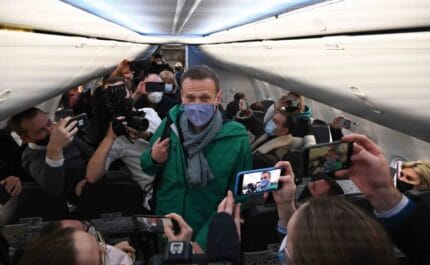Stranger than fiction: the extreme state of reality TV
In March 2017 contestants on a UK reality show discovered they had spent eight months struggling to survive in a remote part of Scotland for the sake of a TV series no one was watching. At the same time it was reported that a new Russian show billed as the Siberian Hunger Games where anything goes, even murder, was getting ready to shoot. Was this the moment reality TV finally lost touch with reality? Matthew Lee investigates...

Illustrations by Christian Tate
23rd March 2017 (Taken from: #26)
The residents of Eden returned to real life in March 2017. As participants on the Channel 4 show they had been assigned the task of building a community from scratch in the remote Ardnamurchan peninsula of the Scottish Highlands. Cut off from the world, they will have been surprised to learn about the geopolitical turmoil of the past year and – maybe most shockingly – Eden’s cancellation in August 2016, after only four episodes.
According to Scottish local paper The Press and Journal, 13 of the 23 residents left the camp early, with a midge infestation of their fledgling civilisation cited as one reason for their exit. The report also claimed that some contestants had smuggled in food and booze, while others visited the dentist in Fort William after damaging their molars eating chicken feed. Unless Eden returns – and Channel 4 says it will one day reappear – the participants will have left their jobs and families to toil in the wild with nobody watching.
As the residents of Eden ended their unscreened sabbatical, another group of survivalists were preparing for theirs. Many British newspapers published an alarming story in March about Russian show Game2: Winter, in which contestants would have to fend off bears, wolves and one another to be the last person standing after nine months in the forests of Siberia. The organisers pitched their concept thus: “2,000 cameras, 900 hectares and 30 lives. Everything is allowed. Fighting, alcohol, murder, rape, smoking, anything.”
One woman said she didn’t want her child to watch murders on TV, which is silly”
There’s a substantial difference between dental issues in Fort William and getting mauled by a bear in Siberia, but both stories left people shaking their heads in disbelief. How can reality TV producers demand such great sacrifices from contestants? And why on earth would anybody sign up for such misery?
Creating reality
The creator of Game2: Winter claims not to understand what all the fuss is about. “People brought statements to the police, wrote to the president and even created petitions [demanding its cancellation],” explains Yevgeny Pyatkovsky, an entrepreneur from Novosibirsk, Russia’s third biggest city. “One woman said she didn’t want her child to watch murders on TV, which is silly – every second TV series or film shows murders, dead bodies and dismemberment.” Surely you can’t compare playing dead to actually being dead? “They are no different,” Pyatkovsky replies. “Staged or not, what is the difference? Whether it’s a reality show or a film, the viewer is temporarily submerged into the atmosphere, you know?”
When pressed on other odd-sounding claims made about his show, Pyatkovsky says he really can attract two billion viewers, even though that’s nearly a third of the people on the planet. He also confirms reports that contestants will sign disclaimers agreeing not to hold the organisers responsible if anything goes wrong (“It’s a wild forest, not a children’s camp!”), stressing that bear attacks are likely during mating season and that if contestants haven’t built a sturdy shelter by then they’re in trouble.

This real-life Hunger Games seems far-fetched, but is Game2: Winter really so much crazier than what already exists? Spend half an hour channel-hopping and you might find real plastic surgery, real tattoo removal and real extreme weight loss; real naked dating, real sex (in a box) and real marriages between total strangers; real solitary confinement, real sleep deprivation and real employment with a reality TV host who really – yes, really – is president of the United States. Perhaps a reality TV race to the bottom has made us so hooked on voyeurism and schadenfreude that we’ve grown numb to extreme onscreen experiments involving real people.
There’s no shortage of competition when it comes to controversial reality shows but The Swan has the honour of having been described by The New Yorker as “the most sadistic reality series of the decade”. Launched in the US in 2004, the Fox show saw “ugly ducklings” undergo “extreme makeovers”, typically involving extensive plastic surgery, so they could compete in beauty pageants.
Its contestants were recruited by Sheila Conlin, a reality TV casting agent based in Los Angeles who’s worked on shows such as Secret Millionaire, Hell’s Kitchen and I Wanna Marry Harry, in which 12 single women competed to marry Prince Harry before the big reveal – it was not the fifth in line to the British throne but a fairly unconvincing lookalike. “When you have young, impressionable girls you can really make them believe anything can happen,” Conlin says.
Conlin recalls the extraordinary audition for The Swan at which several women turned up with suitcases, saying the casting notice had inspired them to leave their homes and relationships for the chance of a new beginning. “It was one of my favourite shows to work on,” she says, adding that while she understands the criticism, the women were well treated during the process and given advice on what to expect after they left the show. “The contestants went through big changes but they were given so many tools [to succeed],” she says. “In terms of aftercare we do help people prepare – we tell them that returning to the real world is going to be a big change and we advise them not to look at social media, although of course they do. The biggest challenge for the women on The Swan was going back to their old lives, which had not changed. But we can only do so much, right? People have to take some responsibility for themselves.”
When you have young, impressionable girls you can really make them believe anything can happen”
Choosing contestants who can handle the demands of reality TV is critical, she says. Many are “a bit delusional” and will go to almost any lengths to experience fame. “I can see straight through people who just want to be on TV and I won’t pick them,” she explains. “Almost everybody wanting to be on reality TV is seeking to be heard and seen, but they also have to be genuine. If you’re trying for a show such as Survivor you can’t be too fragile and if it’s Hell’s Kitchen with Gordon Ramsay you’ve got to demonstrate your passion for being a chef.”
The Swan is joined in the annals of controversial reality shows by There’s Something About Miriam, a British series in which six men competed for the attentions of a beautiful Mexican model. It concluded with the group gathered on a sunny Ibiza terrace to witness Miriam reveal her secret – she was a pre-op transexual – to contest winner Tom, who initially accepted the £10,000 prize and week-long cruise with the person he’d so eagerly pursued. But the contestants later lawyered up to sue the producers for personal injury, saying they’d been tricked into sexual contact with a man. The claims were settled and the show aired in February 2004.
“One of the reasons I made Miriam is that I’m intrigued by taboos,” says its producer Remy Blumenfeld, now managing director of independent production company Thinking Violets. “In 2003 transexuality was still taboo and putting a real-life transsexual on TV was confronting that. We wanted to see whether physical sexual attraction was below or above the waist.”
The contestants felt humiliated because the woman they fancied told them she had a penis”
While Blumenfeld accepts that he mishandled the situation on set, he thinks a bigger problem was his failure to realise that the British public was still a few years away from being ready for this topic of discussion. “Today the trans community is far more visible and it wouldn’t be considered so shocking. The contestants felt humiliated because the woman they fancied told them she had a penis,” he says. “That was their terrible humiliation. They never saw her penis but the knowledge she had one was apparently distressing. They were buoyed by the tabloid press, which said the show was appalling, and at the time the world seemed to agree. But it really wasn’t appalling – it was done with Miriam’s knowledge and full consent and the boys, who were picked with the help of a psychologist because they were tolerant and open-minded, were told to expect twists and surprises.”
Entering reality
If the residents of Eden hoped to emerge from the wilderness as household names, they’ll have been sorely disappointed. But the show’s failure might end up being a blessing in disguise.
“A lot of people go into reality TV thinking they’ll make money, become famous or start a clothing line,” says Sophia Wardman, author of the Surviving Reality TV blog. As a veteran of two reality shows, Shipwrecked and The X-Factor, she’s experienced the disconcerting weirdness of sudden fame. “When I was on The X-Factor we were suddenly in cars trying to hide our faces from paps on motorbikes,” she recalls. “And being in the tabloids was so weird. There was a story about how Niall [Horan] from One Direction had a crush on me – a journalist asked him if he had to choose one contestant he fancied who it would be, and he chose me. The abuse I got on Twitter was unreal. Because I was 23 and he was 16 I had people online calling me a paedophile. I hadn’t said anything.”
But returning to normality is often even tougher to cope with. A few months after appearing in The X-Factor in 2010, Wardman was back in her small Yorkshire town in need of money. “I started working at a bar and people kept saying to me, ‘Oh my God, you’re back here, you must be so upset,’ she says. “Fame is an addiction and when you come down from it you get withdrawal symptoms and it’s easy to feel like you’ve failed. My mental health was quite poor and I was teary most of the time, lacking motivation. Luckily I had a good support network of friends and family, but some people don’t have that and that’s where coping mechanisms like alcohol come in.”

Reality TV contestants today have some idea of what they’re getting themselves into. Applicants can look to Jade Goody, Kerry Katona, Katie Hopkins and Chantelle Houghton for any number of inspiration points or warning signs. Yet for the people who went first the risks weren’t so obvious – spare a thought for “Nasty” Nick Bateman, who attempted to win the first series of Big Brother in 2000 through the Machiavellian manipulation of his fellow housemates only to become a national hate figure who was hurried to a safe house after being expelled from the show.
Yet even his experience was a breeze compared to accidental guinea-pig Nasubi (‘Aubergine’ in Japanese).
Susunu! Denpa Shonen (Don’t Go For It, Electric Boy) was notorious in the late ’90s for its sadistic stunts involving real people, the most bizarre of which involved up-and-coming comedian Nasubi spending 15 months naked in a room. Having passed an audition for a new TV show he agreed to attempt to survive without any possessions – including clothes, food and toilet paper – until he’d won a million yen’s (around £7,000) worth of prizes by entering mail-in sweepstakes in magazines.
He’d been told to record himself by putting tapes in a camera, which would be picked up each day by the producers and might be broadcast one day. Nobody told him that highlights from his naked life were being shown to 15 million viewers a week, a cartoon aubergine covering his genitals.
Do you mean everyone has been watching my naked body all this time? That’s out of order”
Every Sunday evening viewers saw an increasingly skinny, hairy and unhinged Nasubi living off dog food – the only edible thing he’d won – and frantically entering sweepstakes. When he made his million, he was woken by producers firing party poppers at his genitals, blindfolded, clothed and whisked to South Korea. After a day’s sightseeing he was taken to his room – which was identical to the one he’d just escaped from – where he had to repeat the challenge in a foreign language. After another four months he was taken to yet another room, but this time the walls collapsed and he was greeted by a cheering audience. “Do you mean everyone has been watching my naked body all this time?” asked Nasubi, now a household name. “That’s out of order. Is it allowed?”
Perhaps the most extraordinary thing about Nasubi’s ordeal is that the door to his room was unlocked the whole time. He explained in subsequent interviews that he didn’t leave because obligation and endurance are important values in Japanese culture, and because he didn’t have any clothes to wear in the outside world.
As long as the contestants build their houses before bear-mating season and don’t kill each other, Game2: Winter may not turn out to be half as cruel as this show from 20 years ago. One applicant, Mats Goldberg, a Swedish survivalist who’s planning to leave his young family behind while he spends nine months alone in Siberia, thinks it’s perfectly doable. “I’ve seen [Werner Herzog film] Happy People: A Year in the Taiga and I know that surviving in Siberia on nature alone is not impossible,” he says. He wants to grow his adventure-tourism business, and exposure to even a tiny fraction of Yevgeny Pyatkovsky’s estimated two billion viewers would be good for him – unless the exposure to minus 50 degrees Celsius temperatures finishes him off before the orders start pouring in.
Subverting reality
Whether it’s a fake Prince Harry, an unanticipated penis or a depressingly familiar Seoul hotel room, all the best reality shows have a twist in the tale. And as things turned out, Game2: Winter was no different. On 31st May, Mats Goldberg found a video uploaded by Yevgeny Pyatkovsky containing a surprise – the whole thing was a stunt cooked up by the Russian to demonstrate his genius for marketing to potential clients.
“I spent all night reading Russian media and [social media site] VKontakte forums and most people were saying that Yevgeny is a scumbag,” says Goldberg. “I spent around $400 on marketing and training but others spent far more. One man sold his house because he was certain he’d be selected.”
Pyatkovsky is unmoved by the criticism. “The aim was to see if I could get all the mass media on earth [to cover my marketing project],” he tells us in a follow-up interview. “I have gained a foundation for all of my future projects, which will be masterpieces.” Nor does he feel guilty for wasting applicants’ time. “I refreshed their lives,” he says. “For example, three of them learned Russian, one worked so hard they paid off their mortgage in two months and two of them started writing poetry.”

But would a real Game2: Winter have been a success? Pyatkovsky says that while people were drawn to the promise of murder and rape, stating that “the more disgusting and stupid the idea, the more it’s in demand”, the reality would have been more prosaic. “It would be doomed to failure,” he says. “Firstly, there is no sex. In all those survivor shows there is sex everywhere. Naked bodies, tropical islands… Imagine a woman in an ushanka [a Russian fur cap], sheepskin coat and felt boots – where is the sex appeal? And when people are preoccupied with hunting for food and building a house, they don’t fight as much as would be preferred.”
The humdrum show he’s describing doesn’t sound a million miles from Eden, whose four episodes consisted mostly of building, gardening, fishing and cooking, with only a few precious moments of flirtation and squabbling. Perhaps Pyatkovsky is right. Maybe the reason Eden’s viewership halved over its four episodes was due to a lack of sex and violence. And perhaps he’s not so crazy to suggest it’s hard to tell the difference between reality and fiction these days. The contestants who left Eden to discover the UK had left the European Union, Leicester City had won the Premiership and Donald Trump was now president of the United States might be inclined to agree.
Slow Journalism in your inbox, plus infographics, offers and more: sign up for the free DG newsletter. Sign me up
Thanks for signing up.








